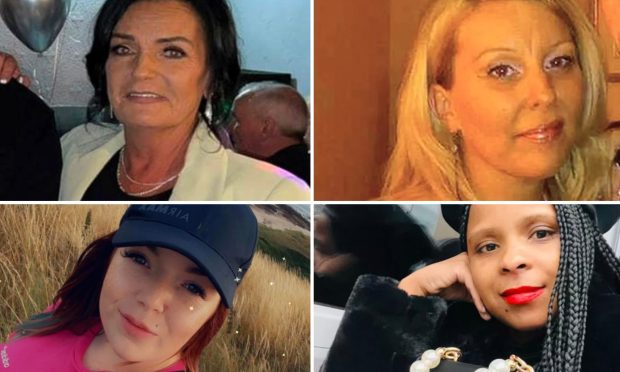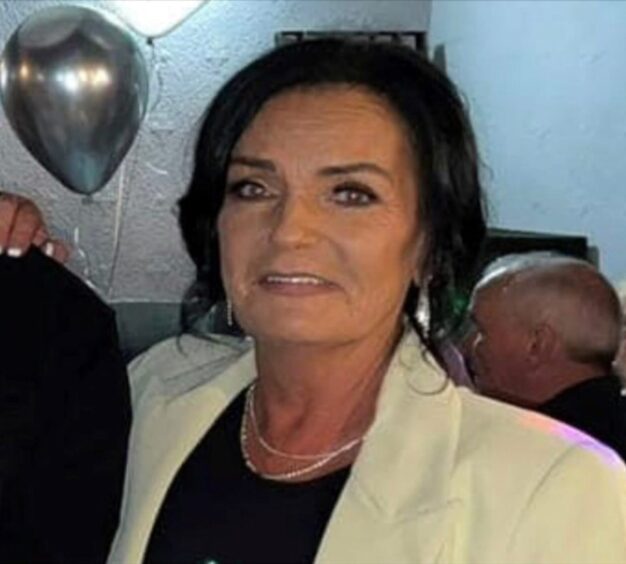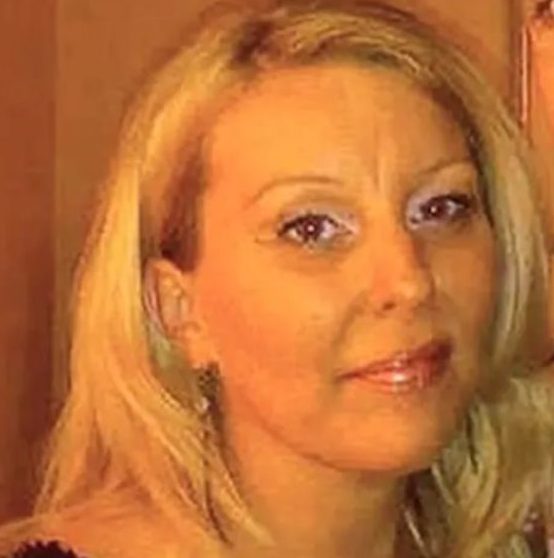
One woman has been killed every fortnight in the past eight weeks, sparking fears the number of violent deaths could be double last year’s toll.
If the scale of domestic violence continues at the same rate, more than 30 women could lose their lives in Scotland by the end of the year.
Now campaigners are calling for the Scottish government, police and justice systems to act – and put in place the range of reforms they have been calling for years.
Last year, experts called on the Scottish government to bring in Domestic Homicide Reviews – a multi-agency probe into any woman’s death where there has previously been domestic abuse – but the consultation process is still under way.
The called-for domestic abuse register is still nowhere to be seen.
And calls for domestic abuse experts to accompany police when they deliver information about an abuser’s past to new partners appear to have fallen on deaf ears.
The victims
Ann Coll
22.12.23: The grandmother of eight, 61, was murdered in her Rutherglen home three days before Christmas.
Ann had walked her dog at around 5pm on December 21 and left her home on Newfield Place for a second time at 8pm, returning around 8.30pm with CCTV of her inside a local shop.
No one has been arrested but police say they are working on a positive line of inquiry.
Alison McLaughlin
5.1.2024: Alison, 53, was found at her home in Banff Road, Greenock, in a horrific murder-suicide. The body of her husband, Neil, 57, was also found at the property.
When their deaths were officially registered, it was revealed that Alison had died from knife wounds to her neck and body and Neil had stabbed himself in the heart.
The couple had been married for 25 years and had just become grandparents.
Naso Isaacs

1.1.2024: Naso, 33, was found dead at the family home at Craigleith Avenue, North Berwick, on New Year’s Day.
Her husband, Mompati Dodo Isaacs, 37, has been charged with murder and has appeared in court.
The couple are originally from Otse, a village in Botswana. They had been living in Scotland for around six months.
Kiesha Donaghy

16.11.23: Kiesha, 32, was found dead at her home at Anderson Drive in Elgin just before 7.30pm on November 16, sparking a major inquiry.
A local man, Owen Grant, 41, has appeared in court over the death of the mother of two.
Acclaimed violence against women expert Dr Jessica Taylor said: “What we are seeing right now is a new wave of misogyny and violence against women. You can dress it up in all kinds of words that make it sound safer or more acceptable, such as domestic violence, coercive control or try and blame it on the economic crisis. But the truth of the matter is that we have become a pro-violence pro-abuse society.
“For years we have done nothing but glorify and sensationalise violence, murder, rape and abuse.
“At the same time, we have a justice system which is failing to deliver, and jails being emptied of abusers, stalkers and rapists, without as much as a tag, simply to create more room. Until we address all of these things, properly regulate porn and make misogyny culturally unacceptable, things will continue to escalate.”
The writer, broadcaster and founder of Victim Focus, an organisation working to help victims of crime, carried out a recent study involving thousands which found virtually every woman and girl will suffer at least 37 incidents of violence, sexual assault, harassment or rape in their lifetime. Only 0.3% will escape without incident.
Dr Taylor said: “I’ve replicated our study many times and came to the same conclusions. It proves that for decades, official crime figures failed to identify the real picture.”
The expert says most don’t report incidents because they fear the justice system is “broken”.
She said: “It’s not broken. It’s working exactly the way it was designed – to protect men and perpetrators. We don’t have a society where violence against women and girls is abhorred. Until society changes that, we will continue to see these shocking figures.”
One of the world’s most respected experts on domestic violence, professor Jane Monckton-Smith, said: “The figures of women killed in Scotland over the past few weeks worry me…they should worry every single person. We don’t have the latest official crime figures, but I fear from what we are seeing here that the number of victims could double.
“So many cases get lost within the system, suicides that are not really suicides but domestic homicide, as well as the hundreds of thousands of assaults and incidents that never get reported because victims are so terrified. We must act to bring in effective change as the situation is now out of control.”
The professor, whose book, In Control – Dangerous Relationships And How They End In Murder, has been given to every Scottish MSP and lawmaker by The Sunday Post, believes we can begin by not describing partner-based violence as domestic abuse.
She said: “We should call it out for exactly what it is…domestic terrorism. We don’t properly recognise the full effect of this type of violence, and how it damages the children who are subjected to it, for the rest of their lives. The damage to society is immense. If the same number of women were being killed by terrorists, there would be such an outcry the government would be forced into action.
“But what we have right now is funding being cut to specialist projects and a lack of safe houses for women and children to escape violence. We desperately need to treat this situation with the seriousness it demands.”
The professor’s book reveals the Eight Steps To Murder, and she bursts the myth that killings happen on the “spur of the moment”.
She said: “Murder suicides are not something that just happen. These usually require meticulous planning but are often dismissed as being done by a man who has acted in a moment of despair. We shouldn’t be making excuses or justifying what a perpetrator does.
“Their game plan was always to kill their partner and then themselves so they are not held to account for what they did.”
Following The Sunday Post’s hard-hitting campaign on hidden homicides – people driven to take their own lives, such as domestic abuse victim Adrienne McCartney, failed time after time by the justice system – the Scottish government has pledged to include cases like hers in its review.
Just a year before the bright 38-year-old mother of three took her own life, she bravely spoke out about court deals done with her abusive husband, Aaron McCartney, which saw the most serious charges against him dropped.
Justice Secretary Angela Constance said: “While overall homicide rates are falling, we remain very concerned at the number of domestic homicides, where the vast majority are women.
“That is why our Equally Safe strategy to prevent and tackle violence against women and girls is so vital, as well as a number of other actions we have taken to strengthen the law and provide support and resources to support those affected.
“We are developing a Domestic Homicide and Suicide Review Model which aims to help identify what lessons can be learned following the death of a partner, ex-partner or child where abuse is suspected.
“This includes those who die by suicide. It would see agencies across justice, health and social care, the third sector and beyond work together to establish what could be done better so we can help to prevent further deaths.
“I would encourage anyone who has witnessed or experienced violence or abuse to contact Police Scotland and seek the support of frontline services.”
Police Scotland’s head of public protection, detective chief superintendent Matthew Paden, said: “All reports are taken seriously and will be thoroughly investigated, and where appropriate we refer victims to specialist support and information that can reduce the risk of further abuse and help them through the criminal justice process.
“Our Violence Against Women and Girls Strategy demonstrates our commitment to tackling the violence and abuse that disproportionately affects women and girls.”
‘We can no longer afford to look away’
by Specialist Solicitor Tony Bone, former chief inspector and senior member of Scotland’s Violence Reduction Unit
As a police officer, then working in the Violence Reduction Unit and now as a solicitor, I have had to deal with domestic violence and the effect it has on everyone exposed to it and it concerns me deeply that we are now seeing an unprecedented number of attacks and incidents.
We need to respond in the same way we responded to knife crime in Glasgow in the early 2000s when the city earned the dreadful name as the “Knife Capital of Europe”.
We need radical thinking and radical change.
We need to accept that as a society we are all responsible.
This is no longer an issue just for the police.
This is no longer an issue just for the criminal justice system.
This is an issue for each and every one of us.
We can no longer afford to look away.
The doctors and nurses who see evidence of domestic abuse need to be able to report it so we can act and stop it.
The nursery schools who see marks on a child and suspect domestic abuse, the teachers and social workers, they all need to be able to come together and respond to it.
If we continue looking away, more women will be beaten, raped, assaulted and killed.
More and more children will be exposed to the brutality and horror of it and spend their own lives with a much higher risk of depression, drug or alcohol addiction because of the trauma.
Domestic abuse is a never-ending cycle which not only wrecks the lives of everyone exposed to it.
If your children are brought up in a war zone, they become warriors.
We managed to change society’s attitude to drink-driving by making it a shameful crime. We need to do the same with domestic abuse.
And I support what Professor Jane Monckton-Smith says, we should be calling it domestic terrorism and give it the significance it should be given.
We have to make this a priority or more women will die and more children will be exposed to unbearable trauma.
It is up to all of us.
‘Men who abuse have capacity to change’
by Gill McKinna, head of the Caledonian System national team at Community Justice Scotland
If we want to help men change their abusive behaviour, we need to hold them accountable, and this can be done through perpetrator programmes.
The Caledonian System is an integrated approach to addressing domestic abuse. It combines a court-ordered programme for men aimed at changing their behaviour with support services for women and children.
We believe men who abuse have the capacity to change their behaviour and we work with them to help them address the underlying attitudes and beliefs that underpin their abusive behaviour.
Since 2016, 2,246 men have started the Caledonian men’s programme and 2,323 women have been offered the support of the Caledonian women’s service.
The Caledonian System has been embedded in justice social work in a number of local authorities across Scotland since 2011.
The Scottish government commits £4.1 million annually to support delivery of the system and it is now in operation across 20 local authorities in Scotland. The Scottish government is committed to making it available across all local authorities in Scotland.
Research demonstrates that men who have completed the Caledonian men’s programme are judged to be a lower risk to partners, while children and women who have taken up the support of the service have reported that it made them feel safer.
At Community Justice Scotland we believe it’s important to reduce the risk to women and children – and to improve the lives of women, children and men.

Enjoy the convenience of having The Sunday Post delivered as a digital ePaper straight to your smartphone, tablet or computer.
Subscribe for only £5.49 a month and enjoy all the benefits of the printed paper as a digital replica.
Subscribe
 © Police Scotland
© Police Scotland © SYSTEM
© SYSTEM